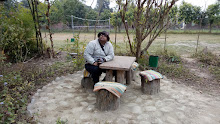|
Botanical
Name: |
Alstonia
scholaris (L.)
R. Br. |
|
Family: |
Apocynaceae |
|
Common
Name: |
Scholar Tree, Indian Pulai, White
Cheesewood, Devil Tree, Blackboard Tree, Milkwood Pine, Dita Bark |
|
Distribution: |
The native
range of this species is Tropical & Subtropical Asia to N. Australia. |
|
Habit: |
Tree |
|
Uses: |
· Alstonia
scholaris has many medicinal properties like antimicrobial,
antiamoebic, antidiarrheal, antihypertensive, antimalarial, febrifuge,
stimulant, hepatoprotective, immunomodulatory, anti-cancer, antiasthmatic, antioxidant,
analgesic, anti-inflammatory, anti-fertility, and anti-diabetic. |
|
· The leaves and the latex are applied
externally to treat tumors. The dried leaves are used as an expectorant. The
leaves can be used to treat skin diseases. |
|
|
· Latex is used for chewing gum. |
|
|
· The roots and bark are used in
traditional medicine as an astringent tonic, alterative,
antidiuretic, and antiperiodic. The bark is used in
Ayurvedic medicine to treat fever, malaria, troubles in digestion,
tumors, ulcers, asthma, and so forth. The bark and roots are boiled with rice
and eaten by girls daily for several weeks to treat excessive vaginal
discharge. |
|
|
· The ripe fruits of the plant are used in
syphilis and epilepsy. |
|
|
· The wood is too soft so it is usually
used for manufacturing packing cases and boxes for packing tea, writing boards, and lamina boards.
Also, a tree has been used to make paper. |
|
|
Wood charcoal is used for gunpowder. |
Thursday 8 December 2022
Subscribe to:
Posts (Atom)

%5D+ban+tulsi.JPG)








,+leaf+sheaths+are+larger,+flowers+are+lighter+yellow,+larger+and+lesser+number+of+rays.+In+Anothum+stems+are+grass.JPG)
